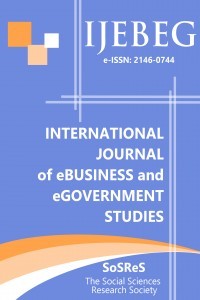THE IMPACT OF INFORMATION AND COMMUNICATION TECHNOLOGY ON ECONOMIC GROWTH: TURKISH CASE
THE IMPACT OF INFORMATION AND COMMUNICATION TECHNOLOGY ON ECONOMIC GROWTH: TURKISH CASE
In the modern economic perspective information and communication technology is seen as an important production factor by reason of knowledge-driven (new) economy. Many researches assess that knowledge, innovation and technological changes become important factor for economic growth. Furthermore modern growth theory highlights the importance of knowledge for economic growth. Depending on this, investing on information and communication technology becomes more important. Therefore, determining the impact of information and communication technology on economic growth arouse interest of researchers. The main purpose of this paper is to put forth the impact of information and communication technology on economic growth for Turkey with the theoretical background. Characterization of information and communication technologies and a framework of impact of information and communication on economic growth will be presented. On the other hand, impact of information and communication technology on main sectors that effects growth is aimed to be examined. This will provide a better understanding of impacts of information and communication technology on economic growth and ICT-sensitive sectors that effect economic growth for Turkey. The hypothesis to be tested is whether information and communication technology boosts economic growth especially through ICTsensitive sectors. In this context, the importance of results, which obtained from time-series analysis, in examination of the relationship between information and communication technology and economic growth is assessed. Thus, a contemporary analysis of the impact of information and communication technology on economic growth would contribute to discussions.
___
- Antonopulos, Christos and Plutarchos Sakerallis (2009), “The contribution of Information and Communication Technology Investments to Greek Economic Growth: An Analytical Growth Accounting Framework”, Information Economics and Policy, Vol. 21, pp. 171-191
- Brynjolsson, Erik (1993), “The Productivity Paradox of Information Technology”, Communications of ACM, Vol. 12, pp. 67-77 Chew, Han Ei, P. Vigneswara Ilavasaran and Mark R. Levy (2010), “The Economic Impact of Information and Communication Technologies (ICTs) on Microenterprises in The Context of Development”, The Electronic Journal on Information Systems in Developing Countries, Vol. 44, No. 4, pp. 1-19
- Colecchia, Alessandra and Paul Schreyer (2002), “The Contribution of Information and Communication Technologies to Economic Growth In Nine OECD Countries”, OECD Economic Studies no.34 2001/1, Paris:OECD
- Edwards, Sebastian (2002), “Information Technology and Economic Growth in Developing Countries”, Challenge, Vol. 45, No. 3, pp. 19-43
- Erdil, Erkan, Burcu Türkcan and I. Haklan Yetkiner (2009), “Does Informnation and
- Underdeveloped and Developing Countries Case”, Izmir University of Economics Technologies Sustain Economic Growth?
- The Department of Economics Working Paper in Economics 09/01, İzmir: Izmir University of Economics
- Heeks, Richard (2010), “Do Information Technologies (ICTs) Contribute To Development”, Journal of International Development, Vol. 22, pp. 625-640
- Houben, Aerdt and Jan Kakes (2002), “ICT Innovation and Economic Performance: The Role of Financial Intermediation”, Vol. 55, No4, pp. 543-562
- Jorgenson, Dale W. (2001), “Information Technology and U.S. Economy”, The American Economic Review”, Vol. 91, No. 1, pp. 1-32
- Jorgenson, Dale W. and Kevin J. Stiroh (1995), “Computers and Growth”, Journal of Economics of Innovation and New Technology”, Vol. 3, pp. 295-316
- Jorgenson, Dale W. and Kevin J. Stiroh (1999), “Information Technology and Growth”, The American Economic Review”, Vol. 89, No. 2, pp. 109-115
- Jorgenson, Dale W. and Kevin J. Stiroh (2000), “Raising the Speed Limit: US Economic Growth in the Information Age”, Brookings Papers on Economic Activity, Vol. 1, pp. 125-211
- Kim, Doh-Khul (2007), “Information Technology, Economic Growth, And Employment: Evidence From Time-Series Analyses”, Journal of Applied Business Research, Vol. 23, No. 1, pp. 71-78 Oliner, Stephen D. and Daniel Sichel (1994), “Computers and Output Growth Revisited: How Big is the Puzzle?” Brooking Papers on Economic Activity, No. 2w, pp. 273-317
- Oliner, Stephen D. and Daniel Sichel (2000), “The Resurgence of Growthnin Late 1990s:Is Information Technology the Story?”, Journal of Economic Perspectives, Vol. 14, No. 4, pp. 3-22
- Schreyer, Paul (2000), “The Contribution of Information and Communication Technology to output Growth”, OECD Science, Technology and Industry Working Papers 2000/2, Paris:OECD
- Başlangıç: 2009
- Yayıncı: Sosyal Bilimler Araştırmaları Derneği
Sayıdaki Diğer Makaleler
Lee Heng Wei, Mohd Azam Osman, Rosnah Idrus, Maziani Sabudin, Tan Shiang-Yen
Caroline Rosie Jeffrey Nasah, Minah Japang, Goh Say Leng
DISCOURSE PATTERNS IN THE E-DISTANCE LEARNING FORUMS
Zaemah Abdul Kadir, Marlyna Maros, Bahiyah Abdul Hamid
Lynda Priscilla Vincent Richard
Yasuyuki Nishigaki, Yuzo Higashi, Wong Meng Seng, Hideki Nishimoto
Peyman Ghafari Ashtiani, Fateme Asadi
CYBERLOAFING PHENOMENON IN ORGANIZATIONS: DETERMINANTS AND IMPACTS
Derya Ergun OZLER, Gulcin POLAT
ORGANIZATIONAL ADOPTION OF INFORMATION TECHNOLOGIES: A LITERATURE REVIEW
Ibrahim Arpaci, Yasemin Cetin Yardimci, Sevgi Ozkan, Ozgur Turetken
ARE E-BUSINESS TRANSACTIONS REAL NEGOTIATIONS? THE USUAL QUESTION OF POWER AND TRUST
